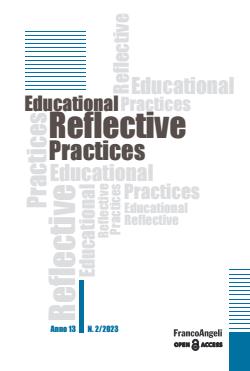Introduzione
- Stefano Oliverio, Joris Vlieghe, Piotr Zamojski, Claudio Melacarne, Introduction: Affirming social justice in education? Post-critical vistas
- Naomi Hodgson, Joris Vlieghe, Piotr Piotr, Manifesto per una pedagogia post-critica
Articoli
- Joris Vlieghe, Piotr Zamojski, Post-critical Pedagogy and Social Justice. Thing Avoidance or Trust in the World
- Astrid Meczkowska-Christiansen, Weaving Justice into the Fabric of Post-Critical Perspective on Education
- Aline Nardo, Affirming Epistemic Equality in Pedagogical Relationships: Outlining Theory and Practice
- Alexander Pessers, Joris Vlieghe, Education as Resisting the Coming Barbarism: A Post-critical perspective on Education, the School and Teaching in the Face of Social- and Environmental Catastrophe
- Pia Rojahn, The Promise of Social Justice through Digitalization in Education
- Stefano Oliverio, Matteo Santarelli, Normativity or the Genesis of Values: On Critique/Post-critique and Educational Pragmatism
- Paolo Bonafede, Federico Rovea, Mingling and Resonance: Education as Guarding the World
- Valeria Catanese, Fabio Maria Esposito, Jessica Parola, Sara Pastore, Leonardo Piromalli, Danilo Taglietti, Emiliano Grimaldi, Paolo Landri, Re-assembling the Digital World, or the Public Sociology of Digital Education Platforms
- Claudio Melacarne, The contribution of post-critical pedagogy in radicalization studies
